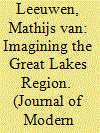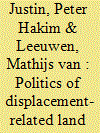|
|
|
Sort Order |
|
|
|
Items / Page
|
|
|
|
|
|
|
| Srl | Item |
| 1 |
ID:
123992


|
|
|
|
|
| Publication |
2013.
|
| Summary/Abstract |
This article analyses frictions in strengthening civil society (CS) for peacebuilding. It argues that frictions are caused by the fact that policies for CS support in post-conflict settings are rooted in a Western discourse on the role of civic actors in politics and society. Consequently, intervention practices do not match local practices of civil society in non-Western, conflict-affected countries. In trying to locate suitable local counterparts, intervening international non-governmental organizations (INGOs) struggle to reconcile criteria of 'international legitimacy' (based on values of inclusivity, tolerance and non-violence) and 'local legitimacy' (local support and roots). The frictions to which this leads are illustrated with case studies from our research over the past years. They show that when intervention models based on such discourses meet realities on the ground, there is often some margin for action and space for negotiation on both sides. In two cases, this led to unexpected outcomes, which were not necessarily negative from the perspective of peacebuilding. However, friction does not always yield unexpected or positive outcomes. In the third case, it led merely to an imposition of norms on the part of intervening INGOs.
|
|
|
|
|
|
|
|
|
|
|
|
|
|
|
|
| 2 |
ID:
084473


|
|
|
|
|
| Publication |
2008.
|
| Summary/Abstract |
The idea has gained ground in recent years that, as conflicts in the countries of the Great Lakes Region are strongly interlinked, regional approaches are necessary to resolve them. This interest in regional dimensions of conflict and peacebuilding also gains currency in other parts of the world. Attention to regional approaches is reflected in the efforts of international organisations and donors to promote civil society peacebuilding. They assume that regional cooperation and exchange between civil society organisations contribute to peace, and provide an alternative to single-country interventions or regional diplomatic initiatives. This paper explores how such assumptions work out in practice. Experiences in the Great Lakes Region show that local and international organisations have difficulty in analysing the regional character of conflict and arriving at collaborative regional strategies. Moreover, local civil society organisations are deeply embedded in the politics of regional conflict. Consequently, the shift to regional peacebuilding approaches remains more theoretical than practical. This paper suggests that international supporting organisations need to adjust their ambitions in regional peacebuilding, but nonetheless have roles in fostering regional identification among civil society organisations.
|
|
|
|
|
|
|
|
|
|
|
|
|
|
|
|
| 3 |
ID:
155007


|
|
|
|
|
| Summary/Abstract |
This paper argues that violent conflict prominently impacts on land governance and so contributes to land conflicts in post-conflict settings. In the natural resources literature, the relationship between land and conflict is often explained in terms of environmental security or political ecology, and many have pointed out that the way land is governed in itself may be a source of conflict. However, less attention has been given to the effects of violent conflict on land and its governance in post-conflict situations. This paper argues that violent conflict affects land governance in many ways and that this in turn might contribute to further violent conflict. The argument builds around an extended case study of the Apaa evictions in Amuru District in Northern Uganda. The case illustrates how conflict around land is not just the result of resource scarcity and competition, but is the outcome of a combination of political, historical and social dynamics. Past policies on land and practices of land governance play a critical role in this. However at the same time, violent conflict has a critical impact on land access, transforms land governance authority and the rules applied. The land conflicts resulting from this, in turn, fuel ethnic tensions between local population groups, and grievances about those in power and the institutions that govern natural resources. The ways in which such problematic conflict-induced changes in land access and governance are dealt with by policymakers is critical for post-conflict stability.
|
|
|
|
|
|
|
|
|
|
|
|
|
|
|
|
| 4 |
ID:
147075


|
|
|
|
|
| Summary/Abstract |
Drawing on empirical evidence from Yei River County in South Sudan, this paper argues that, rather than a temporary phenomenon, displacement may lead to a drastic reorganisation of land occupation and governance. Such reorganisation may become strongly connected to broader political contention. In the case of Yei, existing legal frameworks and institutions are inadequate to deal with land conflicts resulting from massive displacement and return. Crucially, historical grievances result in the displaced no longer being perceived as powerless victims, but as agents of a Dinka agenda to (re)occupy territories in Equatoria, and as perpetrators in land conflict. Such politics of land-control and identity may turn land disputes between displaced people and returnees into a major source of instability. At the same time, those displaced people who are not well-connected politically may lose their land rights.
|
|
|
|
|
|
|
|
|
|
|
|
|
|
|
|
| 5 |
ID:
159212


|
|
|
|
|
| Summary/Abstract |
This article analyzes how transformations of land governance in the new Republic of South Sudan play into processes of everyday state formation. National land tenure reforms and decentralization policies have increased polarization between local public authorities in and around Yei Town, who vie for legitimacy amongst returning refugees, internally displaced people and migrants arriving in the wake of the civil war. Ambiguously worded national policies and shifts in the composition of the population provide a structure of opportunity that works largely to the advantage of chiefs and at the expense of other, more localized customary authorities. Our analysis shows how chiefly and state power are mutually reinforcing. Evolving notions of community land rights further legitimize the centrality of the state in land governance. Highlighting the institutional competition between state and customary authorities, as well as among customary authorities, our findings emphasize the centrality of the state – however limited its presence may be – in land governance, and nuance political economy analyses that overemphasize the role of ethnicity in land contestation in South Sudan.
|
|
|
|
|
|
|
|
|
|
|
|
|
|
|
|
|
|
|
|
|